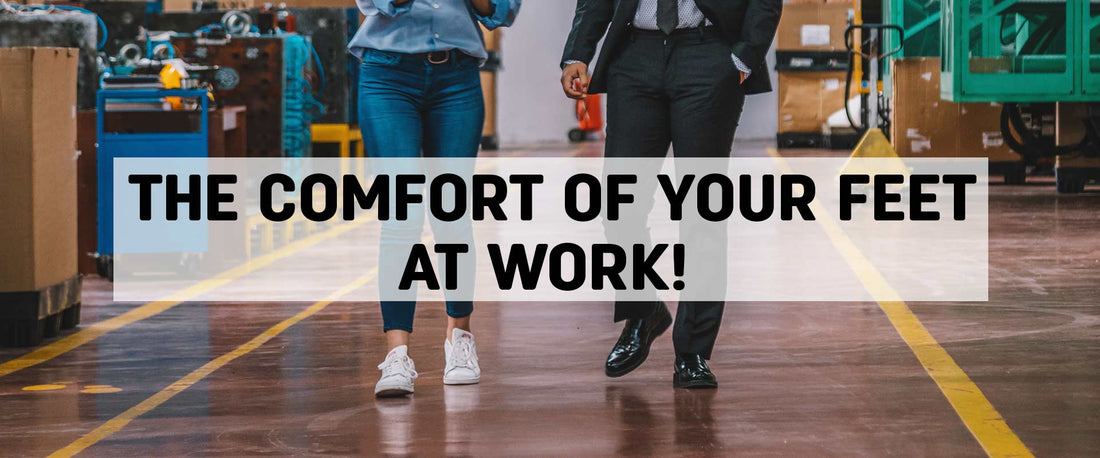It's not just sport that can be a trial for your feet: work can too! Binding shoes, incessant trampling, difficult conditions, uncomfortable position... there are many reasons for foot pain.
Blisters, friction, overheating and tendinitis are all annoyances that can make your daily life a real hell and prevent you from being fully productive in your professional activity. The comfort of your feet is paramount to your efficiency, and also to a pleasant work experience.
Here are 10 expert tips from Marie Maligorne, head of the Sidas podiatry centre, which will allow you to say goodbye to such pains and hello to comfortable feet.
TAKE CARE OF YOUR FEET LIKE AN ATHLETE
More than a recommendation, this first tip is an instruction. The foot forms the basis of everything: not only of the human body, but also your everyday well-being. So there is no such thing as a "little problem" with the foot. Like an athlete, you must take care of your feet and treat any pain promptly so that it doesn't get worse and interfere with your work.
IDENTIFY THE SOURCE OF YOUR PAIN
There are two main stresses that work can put on your feet. The first is the position that your work requires you to maintain throughout the day, whether a very sedentary sitting position in the office, a standing but static position in the production and construction sectors, or perpetual movement in health, catering and agriculture. The second constraint is material, related to the equipment or uniform that you are obliged to wear, very often with uncomfortable shoes, whether safety shoes or heels...
BE AWARE OF THE CONSEQUENCES OF FOOT PAIN
The consequences of pain should lead you to be even more vigilant about ensuring your feet are comfortable. Numbness, blistering, rheumatism, arthritis, toe deformity, tendonitis, stiffness in the arch of the foot, joint pain, etc. The catalogue is extensive. These tensions can also “move up” and cause back or knee problems, but above all else, they bring with them higher risk of a work accident, reduced pleasure and lower efficiency as you are less concentrated and more tired.
DO NOT PUT STYLE BEFORE COMFORT
The favourite shoes you have in your wardrobe are rarely the most suitable for your professional work! Your new trainers may look great, your stilettos stunning and your moccasins of rare elegance, but for work, comfort and safety must take precedence over aesthetics.
CHOOSE THE RIGHT SHOES FOR WORK
As in sports, the choice of your shoes is essential. They must be suited to the pressures exerted by your work on your feet (constant movement, static position...) but also to the rules set by collective agreements.
A good work shoe is:
- - The right size shoe.
- - A well-fitting shoe. It must firmly hold your heel and instep to avoid micro-frictions that can cause overheating.
- - A shoe with a low, wide heel for better balance on your feet.
- - A breathable shoe, whose material and composition respond to the conditions of heat and humidity.
(In this respect, for some professions, trainers can be a "good work shoe").
YOUR SALVATION? INSOLES!

Insoles are your salvation ! Whether as prevention or cure, insoles are the missing component to ensure everyday work comfort.
The benefits of insoles are numerous:
- - Shock absorption thanks to cushioning.
- - The stability of the foot which, when properly held, very much limits the risk of friction.
- - Support for the arch of the foot to reduce fatigue and therefore tendinitis.
- - Hygiene because they can be washed after 8 hours confined in your shoes.
Discover our gel insoles, perfect for your comfort at work : DISCOVER
DO NOT NEGLECT THE SOCKS
Often, our first reaction is to blame foot pain on the shoes. But the comfort of your feet depends on a winning trio of your shoes, your insoles and your socks. You must choose them to suit your working conditions.
KNOW HOW TO TAKE CARE OF YOURSELF
Whatever position is imposed on you by your work, you must realise how to break the continuity of it to rest your feet and more generally your body. If you are sitting at a desk, take advantage of your breaks to move as much as possible. Conversely, if you are constantly moving, take advantage of your break to sit down!
STAND UP STRAIGHT
The standing but static working position is certainly the most restrictive and the most detrimental. In fact, you put a lot of strain on your feet without realising it. To counteract its ill effects, there are a few tips for learning to stand correctly, such as to avoid being hunched, make sure your work space is at the right height and where you can keep your abdominal muscles relaxed. To help you, proprioception (or kinaesthesia) exercises can prove to be a very good complement.
PREVENTION & RECOVERY
Just as an athlete takes care of their feet beyond just their practice time, you also need to heed prevention and recovery measures.
For prevention, think about anti-friction cream and silicone dressings, especially if your shoes are new.
For recovery, opt for stretching and small massages with a regenerating balm.


